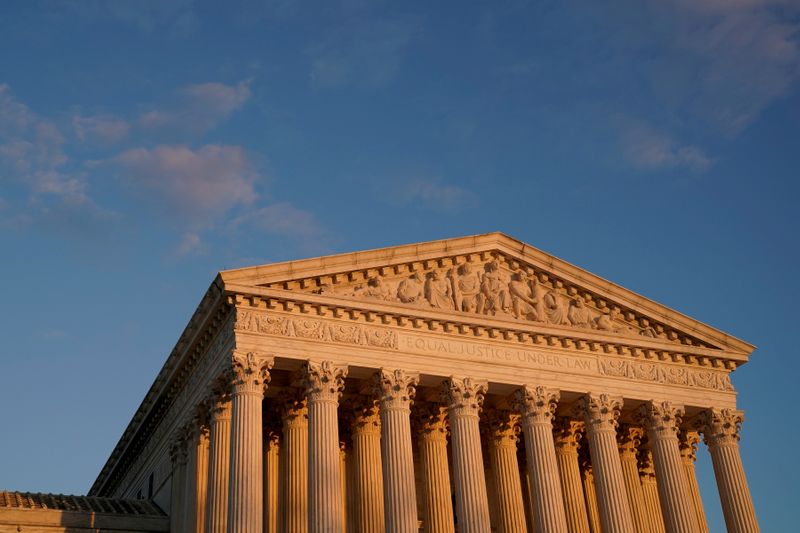With the elderly in mind, U.S. Supreme Court wary of limiting police in home entries
Reuters
Published Mar 24, 2021 01:17PM ET
Updated Mar 24, 2021 02:00PM ET

By Andrew Chung
(Reuters) - U.S. Supreme Court justices returned to the contentious issue of police powers on Wednesday as they grappled with whether to make it easier for officers to enter a home without a warrant for reasons of health or public safety in a case involving the confiscation of a Rhode Island man's guns.
During arguments in the case, several justices seemed wary of impeding officers from quickly responding to grave situations in which a person might be injured or die, using examples of people who are suicidal or elderly people who may need help. Some justices, however, questioned how they could ensure that police would not abuse expanded powers to act without a warrant.
The man, Edward Caniglia, appealed a lower court ruling throwing out his lawsuit accusing police of violating his constitutional rights by bringing him to a hospital for a mental health evaluation and taking away his guns without a warrant after a 2015 argument with his wife.
Lower courts ruled that police in the Rhode Island city of Cranston did not violate the Constitution's Fourth Amendment ban on unreasonable searches and seizures.
There is heightened public scrutiny of police conduct, including how authorities deal with mentally ill people, in the wake of protests in many cities last year against racism and police brutality.
Conservative Justice Brett Kavanaugh said the case highlights two common situations - older people falling and suicides - in which imposing heightened requirements on police would cause them to back away instead of acting quickly.
"The longer you're in the house and no one comes to get you, you're more likely to die from the fall. The statistics are huge on older people dying from falls," Kavanaugh told Caniglia's attorney, Shay Dvoretzky.
Liberal Justice Sonia Sotomayor raised doubts about giving police the authority to judge the severity of any situation on their own without, for instance, the advice of mental health experts.
"Tell me, what is the limiting principle?" Sotomayor asked an attorney representing Cranston.
President Joe Biden's administration backed police in the case. A Justice Department lawyer told the justices that officers should not be required to obtain warrants in situations in which people could be seriously harmed.
In a separate case on police powers, Supreme Court justices last month appeared reluctant to give police unlimited power to enter a home without a warrant when pursuing a suspect for a minor crime.
The Rhode Island case arose from a domestic dispute. An argument between Caniglia and his wife Kim that began over a Walt Disney (NYSE:DIS) World coffee mug swirled into a disagreement about her extended family, according to court papers. At one point, Caniglia retrieved a gun and asked his wife to shoot him to "get me out of my misery," according to court papers.
She decided to spend the night at a hotel, then called police because she feared her husband could be suicidal.
Caniglia, 70, sued the city and the police. The Boston-based 1st U.S. Circuit Court of Appeals upheld a federal judge's decision to dismiss the case. The 1st Circuit concluded that even if the dispute did not constitute an emergency, the police conduct was justified under a legal doctrine that gives officers leeway to engage in "community caretaking" to ensure public safety.
The Supreme Court has applied this doctrine to vehicles, but the 1st Circuit decided it can apply to the home as well.

Caniglia said in court papers he had no criminal history and no record of violence or misuse of guns. Police returned his guns only after he sued.
Written By: Reuters
Trading in financial instruments and/or cryptocurrencies involves high risks including the risk of losing some, or all, of your investment amount, and may not be suitable for all investors. Prices of cryptocurrencies are extremely volatile and may be affected by external factors such as financial, regulatory or political events. Trading on margin increases the financial risks.
Before deciding to trade in financial instrument or cryptocurrencies you should be fully informed of the risks and costs associated with trading the financial markets, carefully consider your investment objectives, level of experience, and risk appetite, and seek professional advice where needed.
Fusion Media would like to remind you that the data contained in this website is not necessarily real-time nor accurate. The data and prices on the website are not necessarily provided by any market or exchange, but may be provided by market makers, and so prices may not be accurate and may differ from the actual price at any given market, meaning prices are indicative and not appropriate for trading purposes. Fusion Media and any provider of the data contained in this website will not accept liability for any loss or damage as a result of your trading, or your reliance on the information contained within this website.
It is prohibited to use, store, reproduce, display, modify, transmit or distribute the data contained in this website without the explicit prior written permission of Fusion Media and/or the data provider. All intellectual property rights are reserved by the providers and/or the exchange providing the data contained in this website.
Fusion Media may be compensated by the advertisers that appear on the website, based on your interaction with the advertisements or advertisers.